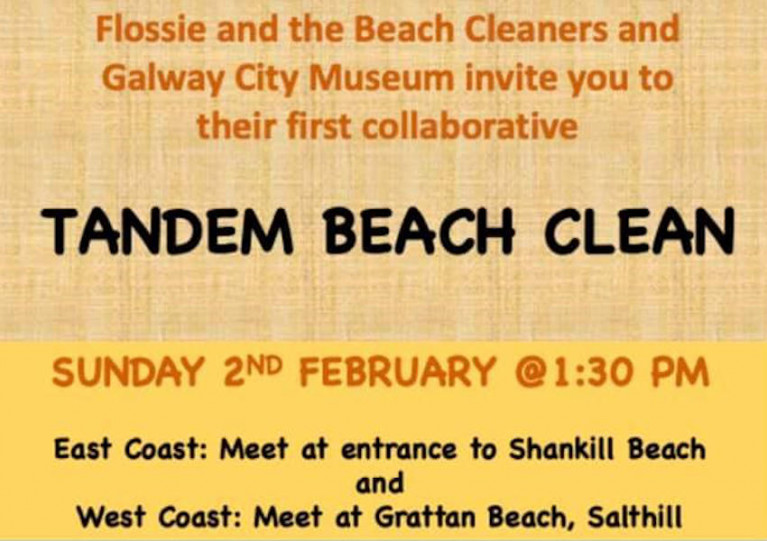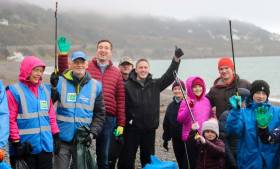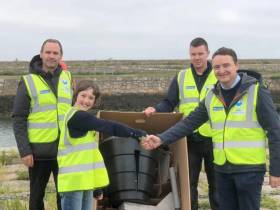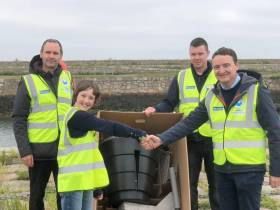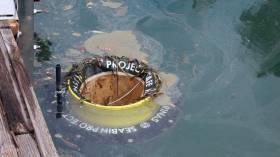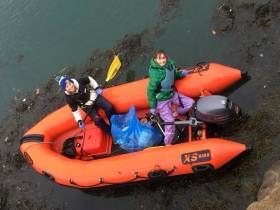Displaying items by tag: Flossie Donnelly
3.5 Tonnes of Waste Removed from Irish Waterways & Coasts In Volunteer ‘Big Weigh In’
Nearly three-and-a-half tonnes of rubbish was removed from Ireland’s coastal areas and inland waterways this weekend as part of a nationwide ‘Big Weigh In’.
Organised by Flossie and the Beach Cleaners, the first-for-Ireland clean-up saw more than 400 people take part across 26 counties on Saturday (31 July).
Intrepid clean-coasts advocate Flossie Donnelly was herself part of the litter-picking initiative at Sandycove on the day, in an effort to gauge “the weight of pollution on the island of Ireland”.
Drum Roll ?!!! The total weight that was taken off our waterways in 26 counties yesterday for our ‘Big Weigh In’ was… 3456kgs?! Thank you SO much to every group, family and solo cleaner that got out there and made a difference. We are a small charity but we are mighty ? pic.twitter.com/DIubsOac9U
— flossieandthebeachcleaners (@flossiebeachcl1) August 1, 2021
In just a two-hour window between 3pm and 5pm on Saturday, volunteers across Ireland removed a whopping 3,456kg of rubbish — the weight of an average orca.
Flossie’s mother Harriet told Independent.ie that among the waste collected from waterways this weekend were carelessly discarded disposable face masks, which do not break apart in water.
Ireland’s East and West Coasts will compete to collect the most marine litter in a simultaneous beach clean this Sunday 2 February.
The Tandem Beach Clean is being organised by Galway City Museum along with Flossie and the Beach Cleaners, an initiative formed by 12-year-old coastal litter crusader Flossie Donnelly who will be no stranger to Afloat.ie readers.
Volunteers will gather at Grattan Beach in Salthill, Galway and Shankill beach in Co Dublin from 1.30pm this Sunday, and both sides will link up virtually at 2.30pm to compare how much rubbish they’ve collected, as well as the highest number of plastic bottles and tin cans.
There will also be a competition for the oldest item picked up along the shore, and a prize for the most unusual find.
Speaking about the event, Flossie said: “We are so excited that Flossie and the Beach Cleaners, Galway City Museum and the Marine Institute will be taking part in the very first ‘virtual beach clean’.
“Month by month the charity will be organising virtual beach cleans around the coast of Ireland until we have a national virtual beach clean. We are delighted that Galway City Museum and the Marine Institute will be joining us for this exciting event. The East meets the West!”
Harriet Dundon, a Marine Institute graduate intern at Galway City Museum, added: “We are becoming more aware of plastic waste in our ocean, and beach cleans are one way we can help make a difference.
“The museum is delighted to be involved in this national event to raise awareness about marine litter and be the first collaborators with Flossie and the Beach Cleaners on the West Coast.”
Galway City Museum hosts the Marine Institute’s exhibition, Sea Science — The Wild Atlantic, the first of its kind in the country, as previously reported on Afloat.ie.
To take part in either beach clean this Sunday, simply turn up on the day — participants will be provided with equipment for rubbish collection and are encouraged to wear appropriate clothing and footwear.
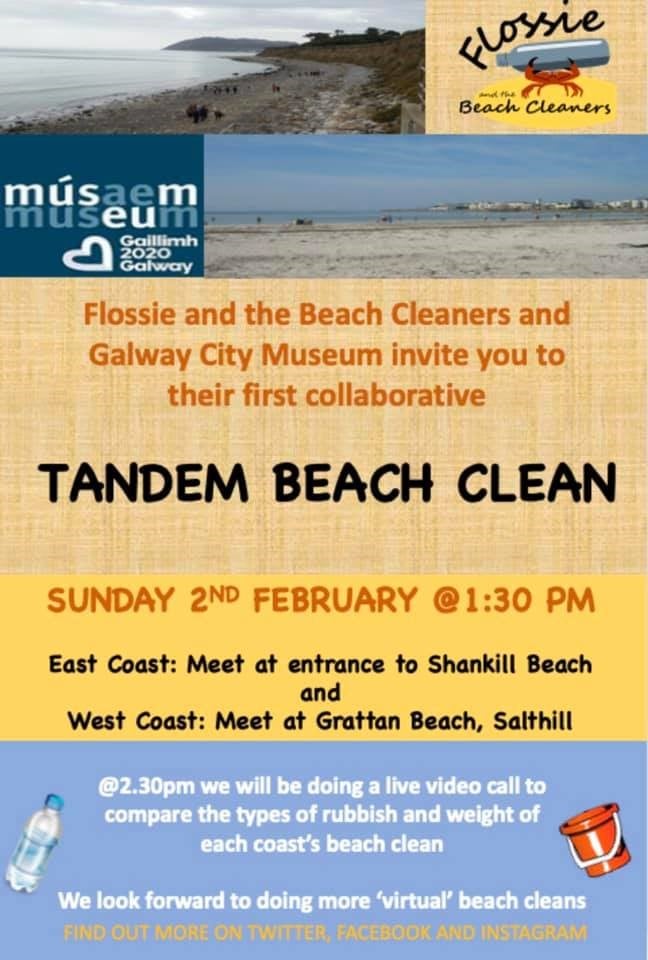
Flossie Donnelly's New Years Day Killiney Beach Clean Up
Dublin Bay youngster Flossie Donnelly made a great start to the New Year with a Killiney Beach Clean Up as part of her ongoing campaign to rid Dublin Bay of plastics.
As Afloat.ie previously reported, young coastal litter crusader Flossie Donnelly celebrating in May the installation of Dun Laoghaire Harbour’s first Seabin after a successful fundraising campaign.
The New Year's Day Killiney Beach Clean up was organised by "Flossie and the Beach Cleaners" and supported by Dalkey Tidy Towns.
Grand Canal Clean Up
Meanwhile, on the Grand Canal in Dublin a litter picking group will meet this Saturday, January 5th at 10 am by Leeson Street Bridge. Pickers, bags, and gloves all provided. Coffee compliments of Starbucks to finish.
#Seabin - Five months after local coastal litter campaigner Flossie Donnelly saw the installation of Dun Laoghaire Harbour’s first Seabin, the enterprising youth has presented the National Yacht Club with its own water-cleaning device.
According to the Dun Laoghaire waterfront club, 12-year-old Flossie’s fundraising efforts for Ireland’s first ever Seabin were so inspiring that the company behind the project donated a second device for free.
The Seabin is essentially a floating bucket with a pump that sucks in surfacedebris and traps it for collection. A single device has the potential to collect as many as 20,000 plastic bottles or more than 80,000 plastic bags each year.
Flossie’s Seabin initiative has since won some influential support from NYC stalwart Annalise Murphy, who raced around the world on board Turn the Tide on Plastic in the most recent Volvo Ocean Race.
The National Yacht Club has more on the story HERE.
Flossie Welcomes First Seabin For Dun Laoghaire Harbour
#Seabin - Young coastal litter crusader Flossie Donnelly is celebrating the installation of Dun Laoghaire Harbour’s first Seabin after a successful fundraising campaign.
The 11-year-old was on hand at noon today (Tuesday 22 May) to see the first of two such devices submerged into the harbour’s waters, where they will quietly trap floating debris on the surface that has become the scourge of regular harbour users.
As previously reported on Afloat.ie, a single Seabin has the potential to collect as many as 83,000 plastic bags or 20,000 plastic bottles every year.
Enterprising Flossie has been campaigning for a cleaner Dun Laoghaire and Dublin Bay since last year, when she began her regular beach cleaning meet-ups in Sandycove.
“When Flossie first approached us, she already knew what she wanted, to install Ireland’s first Seabin and was well underway with her fundraising efforts,” said Dun Laoghaire Harbour Company operations manager Tim Daly. “Her resolve inspired us to whatever we could to help her out.”
Seabin distributor Inland and Coastal Marina Systems also expressed their delight to be a part of the project with Flossie, who will be grand marshall of the first March for the Ocean in Dun Laoghaire on Saturday 9 June.
Flossie Crowdfunding For Seabin In Dun Laoghaire Harbour
#Seabin - Coastal litter crusader Flossie Donnelly has raised hundreds of euro in a crowdfunding campaign to procure a Seabin water cleaning device for Dun Laoghaire Harbour.
The Seabin is simple but remarkably effective, essentially a floating rubbish bin with a pump that traps floating debris — and which has the potential to collect as many as 83,000 plastic bags or 20,000 plastic bottles a year.
Floating rubbish in Dun Laoghaire’s waters and surrounds has been an issue for years, and prompted ambitious Flossie to start a regular beach and harbour clean-ups in South Dublin Bay last summer.
As previously reported on Afloat.ie, the youngster soon attracted a dedicated group of volunteers inspired by the 10-year-old’s drive.
But more could be done with the help of an automated device like the Seabin, for which Flossie also held a fundraising table quiz in Sandycove last November.
As of this morning (Wednesday 31 January), Flossie has raised €650 towards her €3,000 goal. Find out more about the campaign on its GoFundMe page HERE.
How One Girl Is Leading The Fight Against Litter In Dublin Bay
#DublinBay - Litter in the water is a longstanding issue in Dun Laoghaire and Sandycove — but one local schoolgirl has taken it upon herself to do something about it.
Ten-year-old Flossie Donnelly started this past summer calling for volunteers to help clean up the sea shore at Sandycove every Friday evening, even designing her own poster to spread the word on social media and around the neighbourhood.
On her blog, Flossie writes that she was “really sad” that no one came to her first clean-up.
But a meeting at the Forty Foot the next day with county councillor Cormac Devlin led to the word spreading further in the local press.
“It’s very unusual that a child of her age approached an adult and a politician at that. That she is so environmentally aware is wonderful,” Cllr Devlin told the Dublin People in August.
By the end of the summer, Flossie was in charge of her own crew of volunteers helping to remove plastic debris that is dangerous to Dublin Bay’s marine life and local boaters alike.
Despite the shorter days and colder weather of late autumn and winter, Flossie is still leading regular coastal clean-ups and making friends along the way — including an Australian girl whose message she found in a bottle.
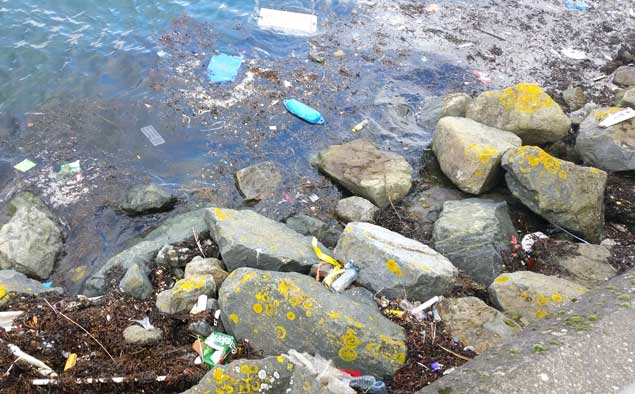 Marine debris in Dun Laoghaire
Marine debris in Dun Laoghaire
More recently, Flossie was out on a RIB in Dun Laoghaire Harbour to clean up the breakwaters — filling three boats with rubbish and doing “a week’s work in a day”, according to Dun Laoghaire Coast Guard, who praised the “inspirational” girl for her efforts.
But the ambitious youngster isn’t stopping there, with plans to raise money for the installation of a Seabin automated cleaning system for the harbour, in what would be a first for Ireland.
Previously highlighted during Afloat.ie’s Rio Olympics coverage last year, the Seabin device has the potential to collect as many as 83,000 plastic bags or 20,000 plastic bottles each year.
That amounts to half a tonne of plastic annually, from visible debris to micro-plastics that threaten our protected species.
Britain’s first Seabin was recently installed at the pontoon of America’s Cup team Land Rover BAR in Portsmouth as part of a project to restore populations of oysters in the Solent.
Flossie and her beach cleaning squad will be hosting a table quiz at Fitzgerald’s Pub in Sandycove next Thursday 30 November to raise funds towards Dublin Bay’s first Seabin. For details see Flossie’s website HERE.


























